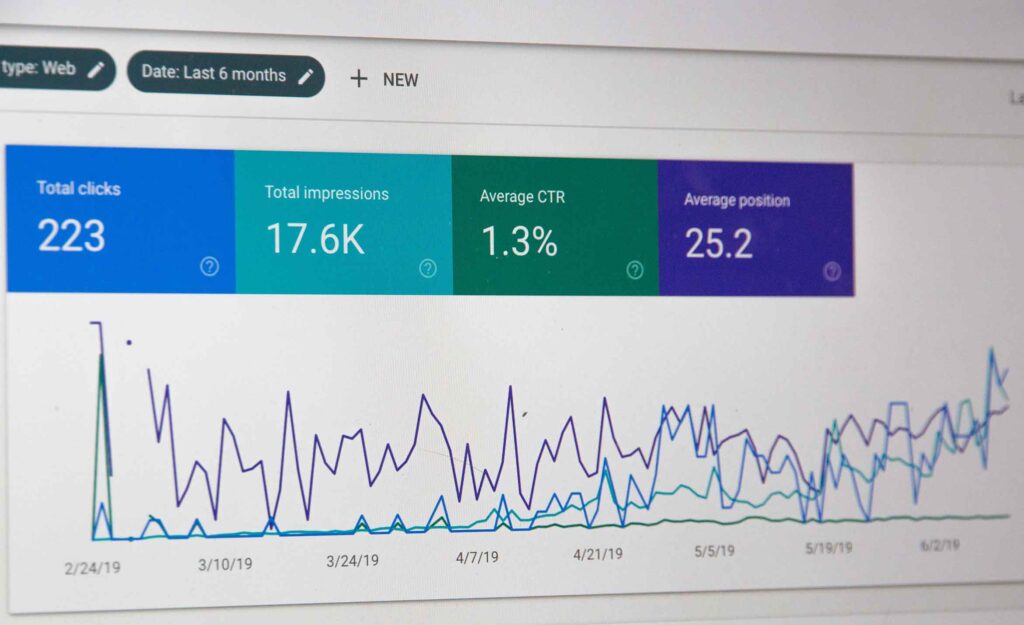As the information on search engine optimisation (SEO) becomes more accessible so too does the spread of misinformation. Unfortunately, this means that if you’re a business owner looking for ways to improve your SEO, it can be easy to be misdirected.
In this blog, we lay down 8 SEO myths you’ll want to keep in mind when you develop your SEO strategy. Whilst you might find websites and articles advocating these myths, we urge you to reconsider and experiment with different SEO strategies to find what works best for your business.
1. SEO does NOTHING

If you’ve heard, read or seen any content that suggests SEO does nothing—this is completely incorrect. Following good SEO practices will get your website discoverable on search engines, attract more organic traffic from search engines like Google and optimise your overall digital user experience.
SEO can be beneficial for any website that wants to increase its visibility and reach more potential customers. SEO is vital to the performance of your digital presence.
If you’re currently practising SEO yet, you’re not seeing results this could be due to several factors. Firstly, SEO is a long-term strategy and its results may not be immediate. You need to give the search engine time to crawl your website and rank content.
It’s also important to keep in mind that SEO is just one aspect of digital marketing, and it should be combined with other tactics to achieve the best results. For example, if you adopt good SEO practices yet, the products you’re selling are faulty—your business won’t reap the rewards.
2. Google prioritises new content

Plot twist: this one’s not a myth!
When search engines crawl a website, they want to see that it is active and regularly updated with new and relevant information. Adding new content to your website on a regular basis can signal to search engines that your website is active and valuable to users, which can help to improve its rankings in search results. This is especially true if your website relies on new and relevant information such as laws, regulations, software updates, technology etc.
Keep in mind, simply adding new content for the sake of it will not necessarily improve your rankings, it needs to be relevant and useful to your target audience. In fact, filling your website with pointless content can actually harm your SEO ranking.
3. Longer content has more value
There is no definitive answer as to whether shorter or longer content is better for SEO as it depends on many factors such as the topic, the industry and the target audience. In general, longer and more in-depth content can be beneficial for SEO as it allows you to cover a topic in more detail, which can help to improve the relevance and authority of your website.
Long-form content can also help to increase the time users spend on your website, which is a positive signal to search engines. Additionally, longer content can also provide more opportunities to include keywords, which can help to improve the visibility of your website for those keywords.
Regardless of whether your content is long or short, it’s essential that the content is quality. For SEO, quality is more important than quantity. Long-form content that is poorly written or not useful to the user will not perform as well as shorter, high-quality content. It’s also important to keep in mind that the optimal length of content varies depending on the topic and the industry, and it’s also important to consider the user’s intent and preferences.
4. Duplicate content, no problem!
According to Google, there’s no such thing as a “duplicate content penalty.” However, this statement often gets misconstrued, leading some to think that an old-fashioned copy and paste job of another’s site, blog or products will fool the Google crawlers. Unfortunately, we wish SEO was that easy. Duplicate content is in fact, a problem.
If you choose to use duplicate content, when the search engine crawls your website, URLs are formed into one cluster and the search engine will select the “best” URL to represent the cluster in the search results.
If your site relies on search traffic (which is nearly all businesses!) then you will want to ensure that your content is original. Keep in mind that unless you’re purposely duplicating content, it’s highly unlikely you will be penalised.
5. Backlinks are dead

Backlinks are very much alive and well in the SEO world. When done well, backlinks can send websites straight to the first position on SERPs. However, if done poorly, you risk being penalised and pushed back into the abyss of page 5 and beyond.
When a search engine crawler finds a link to your website on another site, it will follow that link and index the content of the linked page. The more backlinks pointing to your site, the more likely it is that your site will be considered an authoritative source on the topic, which can help to boost your visibility in search engine results.
However, it’s important to note that the quality of the backlinks is more important than the quantity. Backlinks from reputable and high-authority sites will carry more weight than links from low-quality or spammy sites. Additionally, search engines may penalize a website for having too many low-quality backlinks, or links from suspicious or spammy sources.
Google’s algorithm is getting more sophisticated, it not only checks the number of backlinks but also the relevance, authority, and quality of backlinks.
6. Keyword stuffing is an effective optimisation strategy
Often when business owners or marketers first dive into SEO, they make the mistake of filling their website with keywords on every page, in every product… in every sentence. Although keyword optimisation is important, stuffing a site with keywords to the point where the copy sounds clunky, will harm penalise your site’s performance.
When search engines detect keyword stuffing, they may penalize the website by reducing its visibility in search engine results or even removing it entirely from the index. This is because keyword stuffing is considered to be a manipulative technique that is intended to trick search engines into thinking a website is more relevant than it actually is.
It’s important to note that search engines use sophisticated algorithms to determine the relevance and authority of a website, and they are able to detect keyword stuffing. The best practice for SEO is to create high-quality, relevant content that is naturally optimized for the keywords you want to target. This will help your website to rank well in search engine results without resorting to manipulative techniques like keyword stuffing.
7. Social Media has no impact on SEO

Social media can have an indirect impact on SEO. Social media platforms like Facebook, Twitter, and Instagram can drive traffic to your website, which can help to increase visibility and search engine rankings. When people visit your website from social media and engage with your content, it can signal to search engines that your site is valuable and relevant.
In addition, social media can also help to increase brand awareness and credibility, which can also have an indirect impact on SEO. When people are more aware of your brand, they are more likely to search for it, which can help to increase visibility in search engine results.
Also, having a strong social media presence and engaging with your audience can help you to acquire backlinks. When people share your content on social media, it can create backlinks to your site, which can help to improve your search engine rankings.
8. SEO is only about Google
Google is not the only search engine that utilises SEO and although it’s the most popular search engine, it’s not the only one. Followed by Bing and Yahoo!, it’s important to consider the other search engines your customers are using in order to target your audience.
It’s important to note that while the principles of SEO are the same across different search engines, the specific tactics used to optimize a website can vary. For example, Bing and Yahoo have been known to place more emphasis on backlinks and social signals, whereas Google places more emphasis on the quality and relevance of the content.
How to rank on search engines
If you’re looking to improve your site’s ranking, following good SEO practices will move your website ahead of competitors and in front of the right customer. What determines “good SEO practices” can be dependent on your business model and what products/services you sell.
To determine your business’s SEO strategy, we encourage marketers and business owners to experiment with different techniques, measure results and fine-tune where needed. A good rule of thumb to follow is if the SEO strategy is providing more value to customers, your SEO efforts will be recognised by SERPs.
Here at Cloud Cartel, we offer specialised SEO packages for different businesses across varying industries. If you’re looking to grow your digital presence, chat to our SEO team and we’ll get your name in front of customers.




